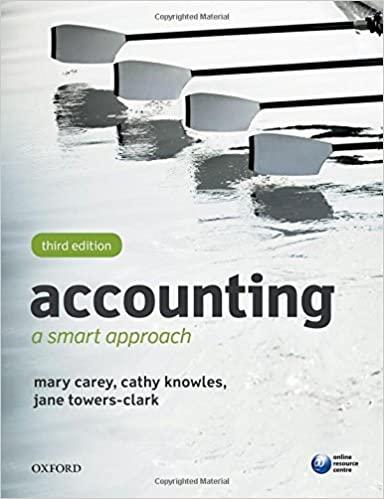Answered step by step
Verified Expert Solution
Question
1 Approved Answer
Brian Jordan is interviewing for a junior equity analyst position at Orion Investment Advisors. As part of the interview process, Mary Benn, Orion s Director
Brian Jordan is interviewing for a junior equity analyst position at Orion Investment Advisors. As part of the interview process, Mary Benn, Orions Director of Research, provides Jordan with information about two hypothetical companies, Alpha and Beta, and asks him to comment on the information on their financial statements and ratios. Both companies prepare their financial statements in accordance with International Financial Reporting Standards IFRS and are identical in all respects except for their accounting choices.
Jordan is told that at the beginning of the current fiscal year, both companies purchased a major new computer system and began building new manufacturing plants for their own use. Alpha capitalised and Beta expensed the cost of the computer system; Alpha capitalised and Beta expensed the interest costs associated with the construction of the manufacturing plants.
Benn asks Jordan, What was the impact of these decisions on each companys current fiscal year financial statements and ratios?
Jordan responds, Alphas decision to capitalise the cost of its new computer system instead of expensing it results in lower net income, lower total assets, and higher cash flow from operating activities in the current fiscal year. Alphas decision to capitalise its interest costs instead of expensing them results in a lower fixed asset turnover ratio and a higher interest coverage ratio.
Jordan is told that Alpha uses the straightline depreciation method and Beta uses an accelerated depreciation method; both companies estimate the same useful lives for longlived assets. Many companies in their industry use the unitsofproduction method.
Benn asks Jordan, What are the financial statement implications of each depreciation method, and how do you determine a companys need to reinvest in its productive capacity?
Jordan replies, All other things being equal, the straightline depreciation method results in the least variability of net profit margin over time, while an accelerated depreciation method results in a declining trend in net profit margin over time. The unitsofproduction can result in a net profit margin trend that is quite variable. I use a threestep approach to estimate a companys need to reinvest in its productive capacity. First, I estimate the average age of the assets by dividing net property, plant, and equipment by annual depreciation expense. Second, I estimate the average remaining useful life of the assets by dividing accumulated depreciation by depreciation expense. Third, I add the estimates of the average remaining useful life and the average age of the assets in order to determine the total useful life.
Jordan is told that at the end of the current fiscal year, Alpha revalued a manufacturing plant; this increased its reported carrying amount by percent. There was no previous downward revaluation of the plant. Beta recorded an impairment loss on a manufacturing plant; this reduced its carrying by percent.
Benn asks Jordan What was the impact of these decisions on each companys current fiscal year financial ratios?
Jordan responds, Betas impairment loss increases its debt to total assets and fixed asset turnover ratios, and lowers its cash flow from operating activities. Alphas revaluation increases its debt to capital and return on assets ratios, and reduces its return on equity.
At the end of the interview, Benn thanks Jordan for his time and states that a hiring decision will be made shortly.
Question : Jordan's response about the financial statement impact of Alpha's decision to capitalize the cost of its new computer system is most likely correct with respect to:
a lower net income
b lower total assets
c Higher cashflow from operating activities
Question : Jordan's response about the ratio impact of Alpha's decision to capitalise interest costs is most likely correct with respect to the:
a interest coverage ratio
b fixed asset turnover ratio
c interest coverage and fixed asset turnover ratios
Question : Jordan's response about the impact of Alpha's decision to classify its lease as an operating lease instead of finance lease is most likely incorrect with respect to:
a net income
b Solvency and activity ratio
c cashflow from operating activities
Question : Jordan's response about the impact of the different depreciation methods on net profit margin is most likely incorrect with respect to:
a accelerated depreciation
b straight line depreciation
c units of production depreciation
Question : Jordan's response about his approach to estimating a company's need to reinvest in its productive capacity is most likely correct regarding:
a estimating the average age of the asset base.
b estimating the total useful life of the asset base.
c estimating the average remaining useful life of the asset base.
Question : Jordan's response about the effect of Beta's impairment loss is most likely incorrect with respect to the impact on its:
a debt to total assets
b fixed asset turnover
c cashflow from operating activities
Question : Jordan's response about the effect of Alpha's revaluation is most likely correct with respect to the impact on its :
areturn on equity
b return on asset
c debt to capital ratio
Step by Step Solution
There are 3 Steps involved in it
Step: 1

Get Instant Access to Expert-Tailored Solutions
See step-by-step solutions with expert insights and AI powered tools for academic success
Step: 2

Step: 3

Ace Your Homework with AI
Get the answers you need in no time with our AI-driven, step-by-step assistance
Get Started


